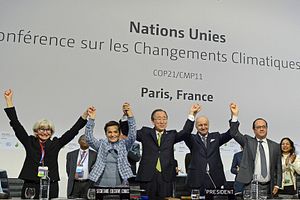The United Nations Framework Convention on Climate Change (UNFCCC) will meet in Marrakech, Morocco from November 7 to 18 this year to take the next steps to implement the 2015 Paris Agreement, which established global greenhouse gas reduction targets. Global warming and the resulting extreme weather have raised worldwide concerns as natural disasters linked to climate change have taken a heavy toll across all borders and put all countries in the same boat. However, Taiwan has been unfairly left out of the UNFCCC forum even though it has taken bold steps on its own to fight climate change.
The UNFCCC’s November meeting in Morocco is the continuation of a process that began in 1992 when countries joined the international treaty as means of fighting climate change and limiting average global temperature increases by reducing their greenhouse gas emissions. In 1995 parties to the UNFCCC adopted the Kyoto Protocol, which included legally binding emission reduction targets for developed countries. Achieving the threshold of 55 countries representing over 55 percent of greenhouse gas emissions, the Paris Agreement, the latest UNFCCC step adopted in December 2015, has been ratified by more than 80 parties to date and will enter into force on November 4, 2016.
While the world seems to be on the right track toward controlling global warming, Taiwan has been left out. Located on an island subject to frequent typhoons and other extremes of weather, Taiwan has experienced firsthand the effects of climate change. This past June, the temperature in Taipei reached 38.7 degrees Celsius, more than 100 degrees Fahrenheit, the highest in 100 years. Weather patterns that once included steady rains have now been replaced by torrential downpours causing flash floods, with significant economic impacts. Conditions in Taiwan parallel record-breaking temperatures and extreme weather events elsewhere around the globe, which most scientists attribute to rising ocean temperatures resulting from increased levels of greenhouse gases in the atmosphere.
As a nation of 23 million people, the world’s 22nd-largest economy, and the 22nd-largest emitter of carbon dioxide, Taiwan has a stake in participating in the global effort to fight climate change. Despite not being a UNFCCC member, Taiwan began working independently on a plan to reduce its greenhouse gas emissions back in 1998 and is one of only a few countries in the world that has passed its own law reducing greenhouse gas emissions.
In 2015, while the parties to the UNFCCC were still negotiating the Paris Agreement, Taiwan took action by enacting the Greenhouse Gas Reduction and Management Act. This act promulgates the government’s determination to regulate greenhouse gases and its goal of cutting carbon emission to 50 percent of the 2005 level by 2050. In September 2015, Taiwan also took the important step of unveiling its own Intended Nationally Determined Contributions (INDC), which is required by the Paris Agreement, committing Taiwan to reduce greenhouse gas emissions by 50 percent from the business-as-usual level (from 428 million tonnes of CO2 equivalent to 214 million tonnes) by 2030.
Despite the challenge recognized by Paris Agreement that “much greater emission reduction efforts will be required in order to hold the increase in the global average temperature to below two degrees Celsius,” Taiwan for political reasons has not been allowed to submit its INDC to the UNFCCC Secretariat. Its exclusion left an important part of global emissions unaccounted for, and makes it more difficult to close the gap between projected and desired temperature increase.
Taiwan has much to offer to the UNFCCC. It has developed green technologies for reducing greenhouse gases that can be shared with other countries. Over the decades, Taiwan has undertaken numerous cooperative projects with developing countries in a wide array of fields related to climate change, including renewable energy, LED street lighting, environmental protection, etc.. Taiwan has also partnered with the United States in the Global Cooperation and Training Framework (GC TF), through which both sides seek to share financial resources and expertise with other countries in combating various future challenges including global warming. By becoming part of UNFCCC and participating in its multilateral efforts and financial mechanisms such as the Green Climate Fund, Taiwan could increase the impact of its contributions.
Climate change is not confined by national boundaries or political systems. Taiwan’s participation is a matter of climate justice, a concept recognized in the Paris Agreement that calls on all states to address this critical global issue. By not being included as a member of the UNFCCC, Taiwan is, in some respects, being left to face climate impact on its own. This contradicts the UNFCCC principle that calls for “the widest possible cooperation” in combating global warming challenges. As a significant global economic actor and a pioneer in green technology, Taiwan and its 23 million people deserve a seat at this vital climate forum. It is time to carry out the UNFCCC’s utmost goal for the sake of human welfare by welcoming Taiwan in the global efforts to curb the climate change.
James K.J. Lee is Deputy Representative of the Taipei Economic and Cultural Representative Office in the United States. He previously served as Taiwan’s Representative to the Netherlands.

































